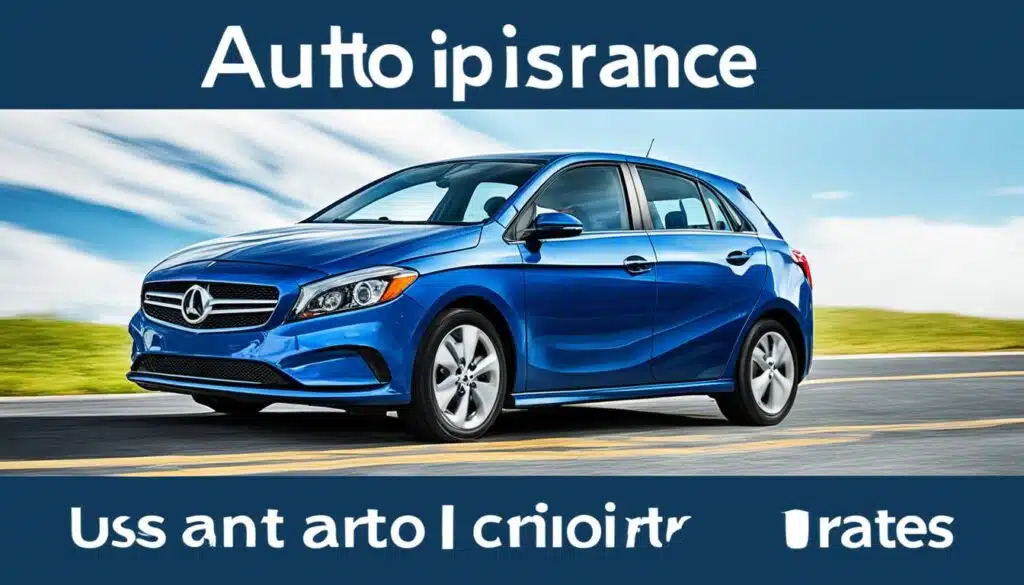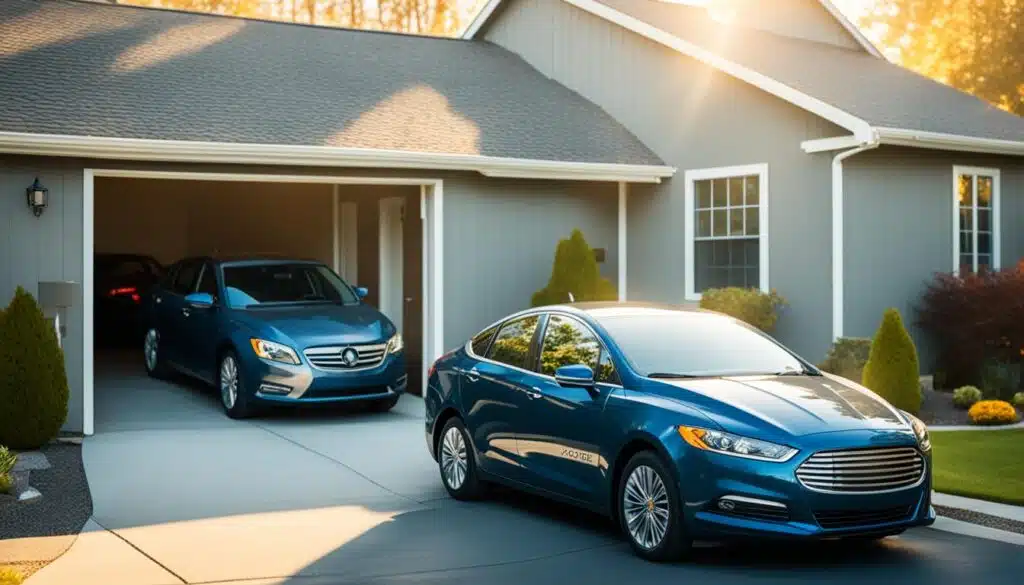Welcome to our comprehensive guide on auto insurance. Whether you’re a new driver or simply looking to brush up on the basics, this guide will equip you with the knowledge you need to make informed decisions about your coverage and protect yourself on the road.
Auto insurance, also known as car insurance, provides essential financial protection in the event of an accident, theft, or damage to your vehicle. It offers coverage options that cater to your individual needs and circumstances, making it crucial to understand the different policies and what they entail.
Throughout this guide, we will explore the various coverage options available, factors that can impact your insurance rates, ways to maximize your savings, and much more. Let’s dive in and get started!
Key Takeaways:
- Auto insurance is a crucial aspect of responsible vehicle ownership.
- Understanding the coverage options and policies available is essential to make informed decisions.
- Factors such as driving record and eligibility for discounts can influence insurance rates.
- Maximizing savings through discounts is possible with the right strategies.
- Auto insurance regulations vary by state, so it’s important to be aware of your local laws.
Understanding Auto Insurance Coverage
When it comes to auto insurance, understanding the different types of coverage is essential. A comprehensive insurance policy provides financial protection against various risks, ensuring that you are prepared for the unexpected.
Types of Coverage
Auto insurance policies typically include three main types of coverage:
- Liability coverage: This type of coverage pays for damages or injuries caused by you to others in an accident. It includes both bodily injury liability and property damage liability.
- Collision coverage: Collision coverage pays for damages to your vehicle in the event of an accident, regardless of fault.
- Comprehensive coverage: Comprehensive coverage provides protection against non-collision incidents, such as theft, vandalism, or natural disasters. It covers damages to your vehicle that are not caused by a collision.
In addition to these basic coverages, you can also opt for specific coverages that enhance your policy’s protection. These may include:
- Rental car reimbursement
- Emergency roadside assistance
- Medical payments coverage
- Uninsured/underinsured motorist coverage
Deductibles: What You Need to Know
When selecting an auto insurance policy, it’s crucial to consider the deductible amount. A deductible is the out-of-pocket expense you must pay before your insurance coverage kicks in.
Opting for a higher deductible can lower your premium, but keep in mind that you’ll need to pay that amount upfront in the event of a claim. Conversely, choosing a lower deductible means a higher premium, but you’ll have a smaller out-of-pocket expense if you need to file a claim.
Understanding Comprehensive Coverage
Comprehensive coverage is especially important for protecting your vehicle against non-collision incidents. From hailstorms to falling trees, comprehensive coverage offers peace of mind knowing that you’re financially protected in various scenarios.
With comprehensive coverage, you’re covered for damages caused by theft, fire, vandalism, and natural disasters. This coverage goes beyond standard collision coverage, providing comprehensive protection for your vehicle.
Keep in mind that comprehensive coverage has limits and exclusions. In some cases, you may need to purchase additional coverage for specific situations, such as flood damage or windstorm protection.
Comparing Auto Insurance Coverage Types
| Coverage Type | Description |
|---|---|
| Liability Coverage | Pays for damages or injuries caused by you to others in an accident. |
| Collision Coverage | Pays for damages to your vehicle in the event of an accident, regardless of fault. |
| Comprehensive Coverage | Provides protection against non-collision incidents, such as theft, vandalism, or natural disasters. |
| Specific Coverages | Additional coverages that enhance your policy’s protection, such as rental car reimbursement and roadside assistance. |
Understanding the different types of coverage and ensuring you have the right amount of protection is crucial for a comprehensive auto insurance policy. It’s important to review your coverage options, deductibles, and specific coverages to ensure that your policy meets your needs and offers the necessary financial protection.
Factors Affecting Auto Insurance Rates
When it comes to auto insurance rates, several factors come into play. Understanding these factors can help you make informed decisions and potentially lower your insurance costs. Let’s dive into the key elements that can influence your insurance rate, driving record, eligibility for discounts, and potential savings based on your circumstances.
Driving Record
Your driving record is a significant factor that insurance companies consider when determining your insurance rate. It reflects your past driving behavior, including any traffic tickets, accidents, or claims. Generally, a clean driving record with no violations or accidents indicates responsible driving habits and can lead to lower insurance rates. Conversely, a history of accidents or violations may result in higher premiums.
Eligibility for Discounts
Insurance companies often offer various discounts to policyholders based on certain criteria. By meeting these requirements, you may be eligible for discounted rates. Common factors that can potentially qualify you for discounts include:
- Safe driving habits and a clean driving record
- Completing defensive driving courses
- Being a student with good grades
- Equipping your vehicle with safety features
- Bundling multiple insurance policies with the same company
Potential Savings Based on Your Circumstances
Your personal circumstances, such as your age, gender, location, credit score, and even the type of car you drive, can also impact your auto insurance rates. Different demographic groups may have different risk profiles, which insurers consider when setting premiums. Additionally, certain areas may have higher rates due to factors like congestion or higher incidents of theft or accidents. It’s essential to review your policy to ensure all information is accurate, as any changes in your circumstances may affect your rates.
By understanding these factors, you can take proactive steps to potentially lower your insurance rates. Maintaining a clean driving record, exploring available discounts, and regularly reviewing your coverage can help you secure the best insurance rate for your needs.

Choosing the Right Auto Insurance Company
Finding the right auto insurance company is crucial. When it comes to protecting your vehicle and ensuring your peace of mind, it’s essential to trust in a reputable provider that offers exceptional customer service and nationwide coverage.
When evaluating insurance companies, it’s important to consider their reputation in the industry. Look for providers with a strong track record and positive customer reviews. Take the time to research their financial stability, as this indicates their ability to meet their customers’ claims.
Customer service is another crucial factor to consider. A reliable insurance company should provide excellent support and assistance when you need it most. Look for providers that offer 24/7 customer service and have a reputation for being responsive and helpful.
Most drivers also look for companies that offer nationwide coverage. With nationwide coverage, you can have peace of mind knowing that your insurance will protect you wherever you go in the United States. Whether you’re on a road trip or move to a different state, your coverage remains intact.
To help you make an informed decision, we have created a table comparing some of the top auto insurance companies in the United States:
| Insurance Company | Reputation__ | Customer Service_________ | Nationwide Coverage_______ |
|---|---|---|---|
| Nationwide | Excellent__________________ | 24/7 support_________________ | Yes_________________________________ |
| State Farm | Highly regarded______________ | Responsive_______________ | Yes_________________________________ |
| Geico | Well-established____________ | Available 24/7____________ | Yes_________________________________ |
| Allstate | Trusted____________________ | Helpful__________________ | Yes_________________________________ |
Remember, when choosing an auto insurance company, it’s important to prioritize trust, customer service, and nationwide coverage. Take the time to compare multiple providers and consider seeking recommendations from friends, family, or colleagues who have had positive experiences with their insurance companies. By doing so, you’ll be on your way to finding an insurance provider that best fits your needs.

Customizing Your Auto Insurance Policy
When it comes to auto insurance, customization is key. Your policy should reflect your unique needs and provide the coverage that gives you peace of mind on the road. In this section, we will explore the different ways you can customize your auto insurance policy to fit your specific requirements.
Understanding Coverage Options
One of the first steps in customizing your auto insurance policy is understanding the various coverage options available to you. From liability coverage that protects you in case of an accident to comprehensive coverage that safeguards against damage from incidents like theft or natural disasters, having a clear understanding of these options empowers you to make informed decisions.
Consider your driving habits, the value of your vehicle, and your personal circumstances to determine the appropriate coverage levels for your policy.
Exploring Insurance Policy Options
In addition to coverage options, you also have the opportunity to choose from a range of policy options. These may include options such as accident forgiveness, roadside assistance, or rental car reimbursement.
Decide which policy options align with your needs and budget. For example, if you frequently travel long distances, roadside assistance might be a valuable addition to your policy, providing you with peace of mind in case of a breakdown.
The Benefits of Bundling Home and Auto Insurance
Another way to customize your auto insurance policy is by bundling it with your home insurance. By combining these policies with the same insurance provider, you can often enjoy benefits such as lower premiums and simplified management.
Furthermore, bundling your policies can enhance your coverage options. For instance, if your home insurance includes personal property coverage, this protection can extend to belongings in your vehicle, providing an added layer of security.
| Benefits of Customizing Your Auto Insurance Policy |
|---|
| 1. Personalized coverage tailored to your needs |
| 2. Flexibility to choose the level of coverage |
| 3. Options to add policy enhancements |
| 4. Potential savings through bundling |
By customizing your auto insurance policy, you can ensure that your coverage aligns with your unique requirements and financial situation. Take the time to explore the coverage and policy options available to you, and consider the benefits of bundling home and auto insurance. With a customized policy in place, you’ll have peace of mind knowing that you’re protected on the road.

Maximizing Auto Insurance Savings
When it comes to auto insurance, finding ways to save money is always a smart move. By taking advantage of various discounts and understanding the average and reported savings, you can reduce your insurance rate and keep more money in your pocket. Here are some strategies to consider:
- Bundle Home and Auto Insurance: Many insurance companies offer discounts when you bundle your auto insurance with your home insurance policy. By combining these coverages, you can save on both policies.
- Maintain a Good Driving Record: Your driving record plays a significant role in determining your insurance rate. By avoiding accidents and traffic violations, you can qualify for lower premiums and enjoy potential savings.
- Take Advantage of Safe Driver Discounts: Some insurance providers offer discounts to policyholders who demonstrate safe driving habits. Installing a telematics device in your vehicle or completing a defensive driving course can help you qualify for these savings.
- Consider Usage-Based Insurance: Usage-based insurance programs, often monitored through mobile apps or telematics devices, track your driving behavior and offer personalized rates based on your actual usage. Safe drivers with low mileage may benefit from lower premiums through this type of coverage.
Maximize your auto insurance savings by bundling your policies, maintaining a good driving record, and taking advantage of safe driver discounts.
In addition to the strategies mentioned above, it’s important to compare quotes from different insurance companies to ensure you’re getting the best rate. Not all discounts are created equal, and different insurers may offer unique savings opportunities. By shopping around and comparing rates, you can find the insurance provider that offers the most competitive prices.
It’s also worth noting that the average savings and reported savings can vary depending on factors such as your age, location, and driving history. While it’s helpful to consider these figures as a guideline, it’s important to remember that everyone’s savings may be different.

By implementing these strategies and staying informed about potential savings opportunities, you can make the most of your auto insurance policy. Remember to regularly review your coverage to ensure it aligns with your needs and budget, and don’t hesitate to reach out to your insurance provider for any further information or clarification.
Understanding Auto Insurance Regulations
Auto insurance regulations are not universal. They vary by state, which is why it is crucial to understand the specific laws and regulations that govern your region. Compliance with these laws is not only essential for your own protection but also for the safety of others on the road.
Each state has its own set of rules regarding auto insurance coverage, uninsured motorist provisions, and minimum liability limits. Some states also have specific requirements for additional coverages, such as personal injury protection (PIP) or medical payments coverage.
It is important to note that driving without proper insurance coverage is illegal in most states. If you are caught driving uninsured, you may face hefty fines, license suspension, or even legal consequences, depending on the state. Proactive adherence to auto insurance laws can help you avoid unnecessary penalties and protect your financial well-being.
“Understanding and abiding by your state’s auto insurance regulations is not just a legal obligation; it is a responsibility that ensures safety and financial protection for yourself and others on the road.” – [Your Name], Auto Insurance Expert
State Laws and Regulations
State laws not only dictate the minimum insurance requirements but also establish guidelines for determining fault, filing claims, and settling disputes. These regulations aim to streamline the insurance process and ensure fair treatment for all parties involved.
To better understand the laws and regulations in your state, it is advisable to consult the official website of your state’s department of insurance. They provide valuable resources and information to help you navigate the complexities of auto insurance regulations specific to your region.
Uninsured Motorist Coverage
One important aspect of auto insurance regulations is uninsured motorist coverage. This coverage protects you if you are involved in an accident with an uninsured or underinsured driver. In some states, uninsured motorist coverage is mandatory, while in others, it may be optional.
Uninsured motorist coverage provides financial support for medical expenses, lost wages, and property damage that result from an accident caused by an uninsured motorist. This coverage offers an additional layer of protection, especially in states where a significant number of drivers are uninsured.
Varies by State
It is essential to recognize that auto insurance regulations are not standardized across the country. Each state has its own unique set of laws and requirements. This means that what may be permitted in one state might not be allowed or may have different regulations in another.
For example, one state may allow insurance companies to use gender or age as factors in determining rates, while another state may prohibit it. Understanding these variations is crucial when comparing insurance policies or relocating to a different state.
Permitted by Law
Auto insurance regulations are in place to protect both drivers and the general public. Adhering to these regulations is not just a matter of compliance but also a responsibility to ensure safety on the roads. By securing the appropriate insurance coverage and abiding by state laws, you are not only protecting yourself but also fulfilling your legal obligation as a responsible driver.
Remember, insurance requirements and regulations can change over time, so it is important to stay informed and regularly review your auto insurance policy to ensure you are in compliance with the current laws in your state.
| Key Points: |
|---|
| Auto insurance regulations vary by state. |
| Understanding your state’s laws is essential for compliance. |
| Driving uninsured is illegal in most states. |
| State laws establish guidelines for fault determination and claims settlement. |
| Uninsured motorist coverage provides protection in case of accidents with uninsured drivers. |
| Auto insurance regulations vary widely from state to state. |
| Compliance with auto insurance laws is a legal obligation and responsibility. |

Exploring Additional Coverages and Options
While understanding the basics of auto insurance is crucial, there are a variety of additional coverages and options that can enhance your policy and provide added protection. In this section, we will explore some of these options, including renter’s insurance, motorcycle coverage, emergency road service, car rental coverage, and insurance for small businesses.
Renter’s Insurance
Renter’s insurance is an often overlooked type of coverage that can help protect your personal belongings in the event of theft, fire, or other covered perils. Whether you live in an apartment, house, or condominium, renter’s insurance can provide financial assistance if your belongings are damaged or stolen. It can also offer liability coverage if someone is injured on your property.
Motorcycle Coverage
If you own a motorcycle, it’s important to have the right insurance coverage to protect both yourself and your bike. Motorcycle insurance can help cover the cost of repairs or replacement in the event of an accident or damage caused by theft, fire, or vandalism. It can also provide liability coverage in case you are found at fault in an accident and someone else is injured or their property is damaged.
Emergency Road Service
When you find yourself stranded on the side of the road due to a flat tire, dead battery, or other mechanical issues, emergency road service coverage can be a lifesaver. This coverage typically includes services like roadside assistance, towing, and lockout assistance. It’s especially beneficial if you rely on your vehicle for daily transportation or travel frequently.
Car Rental Coverage
Car rental coverage can be a valuable option to have if your vehicle is being repaired due to an accident or other covered event. This coverage helps pay for the cost of renting a car while yours is in the shop. It can save you from incurring additional expenses and inconvenience during the repair process.
Insurance Options for Small Businesses
For small business owners who use vehicles for work purposes, commercial auto insurance is an essential investment. This type of coverage can provide protection against liability claims and damages resulting from accidents involving your business vehicles. It can also cover the cost of repairs and medical expenses for injured employees or third parties.
By exploring these additional coverages and options, you can customize your auto insurance policy to meet your unique needs and ensure comprehensive protection. It is important to review your policy thoroughly and consult with an insurance professional to determine which options are most suitable for your situation.
| Coverage Option | Description |
|---|---|
| Renter’s Insurance | Provides coverage for personal belongings and liability for renters |
| Motorcycle Coverage | Protects motorcycle owners against accidents, theft, and liability claims |
| Emergency Road Service | Offers roadside assistance, towing, and lockout assistance |
| Car Rental Coverage | Covers the cost of renting a vehicle while your car is being repaired |
| Insurance for Small Businesses | Provides coverage for vehicles used for business purposes and liability protection |
The Future of Auto Insurance
As technology continues to advance, the landscape of auto insurance is undergoing significant transformations. The integration of emerging technologies such as artificial intelligence and telematics is revolutionizing the way insurance companies operate and the services they offer to their customers. Additionally, the rise of autonomous vehicles and the increasing popularity of mobile apps are reshaping the future of
One of the key innovations in the industry is the development of mobile apps that allow policyholders to manage their insurance policies conveniently. These apps provide users with real-time access to their coverage details, claims status, and even roadside assistance services. With just a few taps on their smartphones, policyholders can easily file claims, monitor their driving habits, and receive personalized recommendations.
Also Read :- What To Consider When Buying Life Insurance
Furthermore, artificial intelligence is revolutionizing the insurance underwriting process. By leveraging advanced algorithms and machine learning, insurers can accurately assess risk levels and determine appropriate premiums for policyholders. AI-powered systems can analyze vast amounts of data, such as driving behavior, location information, and vehicle telematics, to provide personalized pricing options based on individual risk profiles.
“With the advent of telematics, insurance companies can now collect data directly from vehicles, enabling them to offer usage-based insurance policies.”
Telematics technology allows insurers to gather data on factors such as mileage, driving behavior, and even vehicle health. This data not only helps insurers mitigate risk but also provides valuable insights for policyholders to improve their driving habits and potentially lower their premiums. This personalized approach to auto insurance offers benefits for both insurers and policyholders, fostering a more equitable and efficient system.
Similarly, the emergence of autonomous vehicles is poised to reshape the auto insurance landscape. As self-driving cars become more common on the roads, it raises questions about who should be held responsible in the event of an accident. Insurers are adapting to this shift by developing new coverage options that cater specifically to autonomous vehicles. Policies may focus more on the software and technology behind the vehicle rather than the human driver.
Overall, the future of auto insurance is being shaped by technological advancements and changing consumer demands. Mobile apps, artificial intelligence, telematics, and autonomous vehicles are all playing integral roles in this evolving landscape. As the insurance industry embraces these innovations, it is essential for policyholders to stay informed and take advantage of the opportunities they present. By understanding and adapting to these changes, both insurance providers and policyholders can navigate the future of auto insurance with confidence.
Conclusion
In the world of responsible vehicle ownership, auto insurance plays a vital role. Having a comprehensive understanding of the coverage options available, the factors that can impact your rates, and the various ways to save, empowers you to confidently navigate the insurance landscape and ensure the necessary protection on the road.
By exploring the different types of coverage and customizing your policy to fit your specific needs, you can tailor your auto insurance to provide the level of security you desire. Understanding the importance of deductibles and specific coverages further enhances your knowledge, enabling you to make informed decisions about your coverage.
Moreover, taking advantage of discounts and finding an insurance provider that offers excellent customer service and nationwide coverage can help you maximize your savings and enjoy peace of mind. It is essential to stay up-to-date with state laws and regulations, ensuring you are compliant and insured as required by law.
As the future of auto insurance continues to evolve, emerging technologies such as mobile apps, artificial intelligence, telematics, and autonomous vehicles are shaping the industry. Being aware of these trends can prepare you for the changes to come and help you embrace the opportunities they present.
FAQs
Q: What is auto insurance?
A: Auto insurance is a type of insurance that protects you financially in case of an accident, theft or damage to your vehicle.
Q: How can I get a car insurance quote?
A: You can get a car insurance quote by contacting an insurance provider, either online or through an agent.
Q: Are there any insurance discounts available?
A: Yes, there are insurance discounts available that you may be eligible for based on factors like your driving record, vehicle safety features, or bundling policies.
Q: What are some auto insurance coverage options?
A: Auto insurance coverage options include liability coverage, collision coverage, comprehensive coverage, uninsured motorist coverage, and more.
Q: How can I see how much I can save on auto insurance?
A: You can see how much you can save on auto insurance by getting a quote from an insurance provider and exploring available discounts.
Q: Is there a mobile app for car insurance?
A: Yes, many insurance companies offer mobile apps that allow you to manage your policy, make payments, file claims, and more on the go.
Q: How can I get an auto insurance quote personalized to my needs?
A: You can get an auto insurance quote personalized to your needs by providing detailed information about your driving history, vehicle, and coverage preferences.





